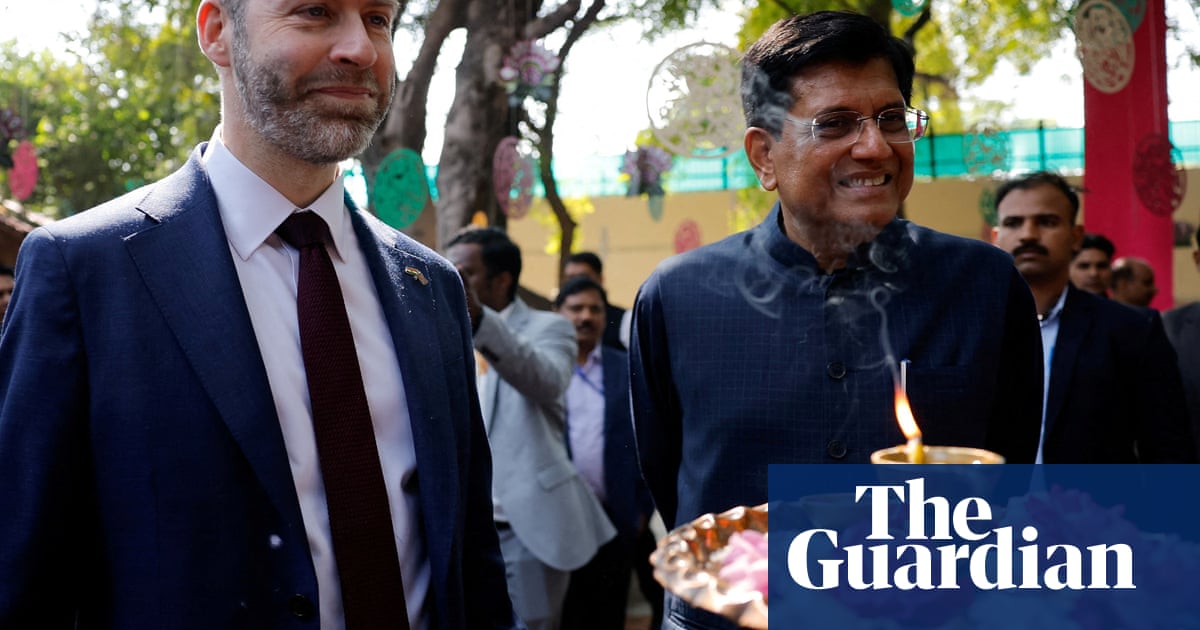Britain andIndiahave agreed a long-desired trade deal that ministers said would add £4.8bn a year to the UK economy by 2040.
The agreement, which was finalised on Tuesday after more than three years of negotiations under successive governments, has long been touted as one of the biggest prizes ofBrexit.
Keir Starmer said the “landmark deal” with India would “grow the economy and deliver for British people and business” after a call with the Indian prime minister, Narendra Modi.
The deal promises a boon for the UK’s car and alcohol industries, which have suffered from the impact of Donald Trump’s tariffs in the US.
India’s tariffs on British whisky and gin will be halved from 150% to 75% before reducing to 40% by the 10th year of the deal, according to the business department.
Tariffs on British cars will be reduced from 100% to 10%, with quotas set on the number of British cars that can be exported to India and vice-versa.
Under the deal, India will cut tariffs across 90% of British product lines, including cosmetics, lamb, salmon, soft drinks, chocolate and biscuits, as well as medical devices, aeroplane parts and electrical machinery. Based on 2022 figures, the tariff cuts are worth £400m.
The UK will lower tariffs on Indian clothes, footwear and food products. Ministers said this would give consumers access to cheaper products and more choice.
Parallel talks to agree a bilateral investment treaty, which would establish legal protections for investments between the UK and India, have not yet reached resolution.
Modi and Starmer are expected to meet in the coming months to sign the deal. Modi tweeted on Tuesday that India and the UK have “successfully concluded an ambitious and mutually beneficial free trade agreement” and that he was looking forward to welcoming Starmer to India soon.
Officials said that by 2040 the deal would increase bilateral trade between the UK and India by £25.5bn, the UK’s GDP by £4.8bn and wages by £2.2bn each year. British negotiators said it was the most ambitious deal ever agreed by India.
As part of the agreement, the UK and India will strike a double contribution convention under which Indian workers temporarily living in the UK will not have to pay national insurance contributions for three years. The same applies to British workers in India, and meets a key demand by Delhi.
Officials said the deal involved no change to immigration policy but would facilitate visa routes for Indian professionals in certain sectors. There will be no exemption from the UK’s forthcoming carbon tax as part of the deal, although talks on this continue.
There will be chapters seeking to improve anti-corruption measures, gender equality, and environmental and labour standards.
Jonathan Reynolds, the business and trade secretary, held talks with his Indian counterpart, Piyush Goyal, in London on Tuesday last week, where the majority of outstanding issues were agreed.
After a brief trip to Norway, Goyal returned to London and met Reynolds on Friday for talks, before returning to India. Negotiators have worked round the clock over the weekend to finalise the agreement.
Reynolds relaunched the negotiations with India on a trip in March to Delhi, where the two sides agreed not to reopen the chapters agreed under the Conservatives.
The deal, which is the biggest and most economically significant trade deal the UK has done since leaving the EU, was wanted by a succession of Conservative prime ministers.
Boris Johnson and Liz Truss both set Diwali deadlines to reach agreements but failed to get them over the line. Under Rishi Sunak, negotiators got close to finalising a deal but this was put on ice when the UK election was called.
Reynolds said: “By striking a new trade deal with the fastest-growing economy in the world, we are delivering billions for the UK economy and wages every year and unlocking growth in every corner of the country.
“In times of global uncertainty, a pragmatic approach to global trade that provides businesses and consumers with stability is more important than ever.”
Mark Kent, the chief executive of the Scotch Whisky Association, said it was “a once-in-a-generation deal and a landmark moment for scotch whisky exports to the world’s largest whisky market”.
He added: “The reduction of the current 150% tariff on scotch whisky will be transformational for the industry, and has the potential to increase scotch whisky exports to India by £1bn over the next five years, creating 1,200 jobs across the UK.”
